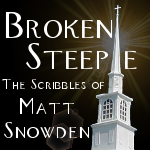
I've thought a good bit about how I share messages lately. Oddly, Twitter has helped. I've mapped out a model and I've been using it in preacing, teaching, and personal evangelism. It's a work in progress. Check it out if you have time and let me know what you think. Thanks!
What Are You Doing: Thinking about Twitter and Communicating the Gospel
I became a pastor at 22 and began preaching three sermons a week. This went for eight years until I accepted a staff position at First Baptist Church in Meridian, MS. This put me on the other side of the Lord’s Supper table for the first time in a long time. I teach several times a week in very different settings and still get to preach often but the Sunday morning change has given me an unexpected gift. Getting the opportunity to listen to sermons and reflect on preaching has helped me do something I have not yet done in my young ministry. I’ve developed a philosophy of preaching. I preached my first sermon at 15 and have preached a truck load of them. I’ve done this with passion and have really enjoyed it. I’ve now had some time to think about what I’m doing and I am grateful.
My thoughts on preaching have been impacted by an unpreacherly source, Twitter. Twitter is a social networking tool that connects people through the sharing of simple messages through the day. I’ve often played host to the wedding of intellectual odd couples. They get together in my brain and send me off in a new direction. Twitter and preaching have synched up in my noodle and here are the resulting thoughts –
Social Networking
Preaching and teaching are acts of social networking. The preaching event draws together a group of people that are connected by a common bond. The people have come to hear and respond. The gathered community is the preacher’s network. Each hearer also sits in the middle of a network of his or her own. The wise teacher or preacher sees both the network gathered under the steeple and the many networks just beyond.
What
When you go to www.twitter.com the introduction page explains Twitter using the categories: what, why, and how. I’ve begun thinking about preaching and teaching using these categories. The WHAT of preaching consists of three things – text, title, and tweet.
The sermon must honor the biblical text. People come to church with the strange notion that they will hear something from God. They want this message to speak to deep needs in their lives but they want it to be more than friendly advice. They get that all week long. If they went to the trouble of getting to church they want to connect with God. A message must be built from the biblical text.
The talk or sermon also needs a title. I’ve found that the really good ones also wind up with nick names. Sometimes I start with the pet name and then write out something for the worship guide. This helps me love the message.
The sermon needs a Tweet. Each sermon or lesson needs a point. Think of an arrow. The entire arrow and the bow serve the purpose of the point. Sermons need to be well tipped. I have friends who go around looking for ancient Native American arrow heads. The heads always last the longest. The same is true for the sermon. The point is what will last.
A Twitter message is called a Tweet. With Twitter, you only get 140 characters. I have not done a good job of sermon prep if I can’t tell you what the message is about on Twitter. When I prepare the point of a message I ask the sermon, “What are you doing?” If I can’t Tweet it I won’t preach it. Calvin Miller and Andy Stanley are my favorite preachers (I don’t know them. I mean technically.). They are big champions of one point preaching. I’ll bet they can Tweet a sermon.
Why
The point of the message must connect with people. The network of people in front of the preacher is the reason for the sermon. The sermon exists for the people because people matter to God. The preacher must make the case for the point. We can’t assume people will care. The "why" part of the message generates creative tension, without which every sermon falls to the ground. What are the people's longings and fears? What does God want for them? These types of questions help craft the why of a message.
How
Application is the gift of a message. To stand in the center of our network each week and talk about the what and why of scripture is not enough. Sadly, we often assume they will know exactly what to do with the message. I think of John the Baptist’s network in Luke chapter 3. After he preached they asked him, “What shall we do then?” As a preacher I need to anticipate this question and work hard at application.
Don’t take notes Tweet.
When I grew up I was taught that the good Christian takes notes during a sermon, so I became a note taker. I’ve been encouraging people to update Facebook and Tweet during lessons and messages. This happened last night as I led a bible study for young adults called The Gathering on Parkway. They were all goofing around with their fancy little phones. I told them to update their status. To tell their network what they were doing. This gets the word out and sends the message down a relational bridge already built for the gospel. CNBC just ran a piece of Mark Driscoll’s encouragement of sermon twittering at Mars Hill Church in Seattle. I hope this goes viral.
Andy Stanley wrote something interesting that applies here, “The last category I might apply a message to is the person who is not there. Every time you speak, somebody is sitting there thinking about someone who really needed to hear what you had to say. Go ahead and address the person who is there but who knows someone who should have been there. Suggest ways for them to get your message in front of that person, tactfully.” Here’s a weird sentence I've come up with that helps me – “We preach to our thems for them AND for their thems.” Preaching is social networking.
These thoughts are really for me and they are a work in progress. Feel free to comment if you can help me with them. I’m working to craft my lessons and sermons based on these ideas so it’s a big deal to me and I’d appreciate your insight. If they help you communicate the gospel then I am really grateful. If you read all this thanks!
you think.











